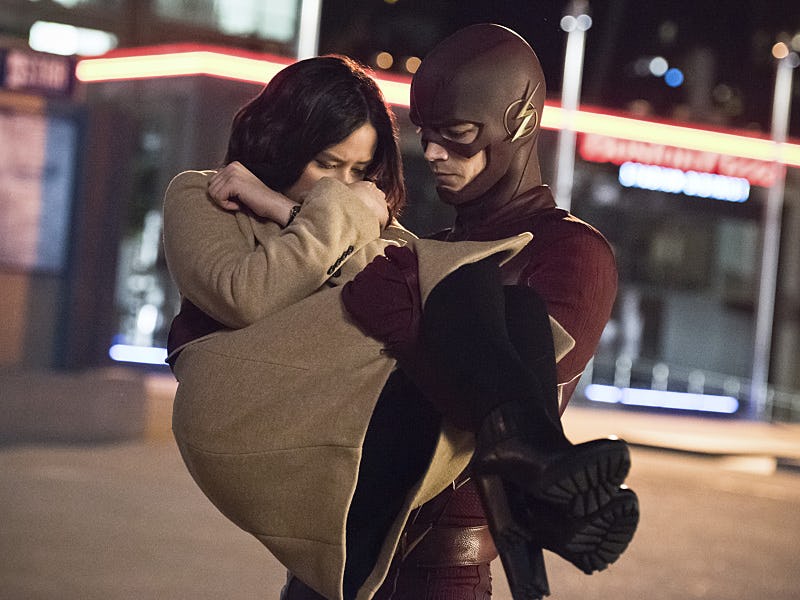Does Being Family Friendly Mean 'The Flash' Can't Adapt Its Darkest Comics?
DC's super speedster isn't a gritty superhero, but that doesn't mean he hasn't seen darkness.

The glut of superhero pop culture hasn’t stopped CW’s The Flash from shining. It’s a rare spin-off that outpaces its predecessor and leaves a transcendent impact on the whole genre. It’s a gift, and we should all appreciate it as such.
But The Flash is also family friendly, and among geekdom, that can be a curse word like “Directed by Uwe Boll” or The Dark Knight Strikes Again. The Parents Television Council, which swears it doesn’t advocate censorship, really loves The Flash for being “upbeat” with “lots of exciting action but little graphic violence.” The Flash is distinctly the PTC’s only primetime show it approves of. (The PTC also hates Arrow, but so do fans who watch Arrow.)
Is this unique distinction for The Flash, a great show, stopping it from adapting its grittier comic book storylines that would make it phenomenal?
The Flash’s shared fandom of nerds and anxious parents is a bizarre turn of events, given it was the latter who petitioned for comic book censorship that led to the annoying Comics Code Authority in 1954 (it died without ceremony in 2011). But during the CCA’s reign, some of the darkest stories from Flash lore arose, like “Absolute Zero” (Flash #182) from Geoff Johns and “The Death of Iris Allen” (Flash #275-284). The Flash has never been a dark or violent superhero — in the Justice League cartoons, Wally West’s Flash was the “funny guy” — but some of his stories do get dark, thematically or in their implications of the human condition.
“The Death of Iris Allen,” as the name implies, is a murder mystery where Barry Allen investigates the death of his wife. The murderer ended up being Eobard Thawne, the Reverse-Flash, who was driven to be with her when his obsession to one-up Barry goes too far. When Iris flat out refuses, Thawne vibrates his hand and crushes her skull, which would haunt Barry for the rest of his superhero career (until her resurrection, because comic books).
It’s a tame comics tale compared to the likes of The Killing Joke or Glenn’s death in The Walking Dead #100, but “The Death of Iris Allen” is agreed to be Flash’s leap into the darker and socially conscious Bronze Age. You can bet that a modern adaptation would go heavy on the story’s allusions to assault and broken gender politics, which until Marvel’s Jessica Jones, had never been properly explored in the genre, let alone on TV.
Captain Cold, one of Flash’s most recognized villains, has developed into his own since his involvement in DC’s Legends of Tomorrow. But that portrayal owes much to Geoff Johns’ “Absolute Zero,” which did for Captain Cold what Batman: The Animated Series did for Mr. Freeze: humanize him. Fans had already known Captain Cold’s abused childhood and the death of his sister Lisa, aka Golden Glider, but the story is a full dive into Leonard Snart’s psyche, a guided tour through the head of a master criminal and killer that compels the reader to empathize. The comic ends with Snart’s weekly appointment with a prostitute, calling it off for the night because his self-reflection killed his mood.
There are other memorable Flash stories that would be hard pressed to fit in a family-friendly show, such as “Blitz” from Geoff Johns (again) where Hunter Zolomon causes Linda Park, Wally’s wife, to miscarry her child. But The Flash’s success isn’t dependent on hot and cold, appropriate/not appropriate stories, but its stunning precision at unearthing the emotion behind the harrowing. This is a show that began its story with the death of Barry’s mother after all, and concluded with it in a way that drove Reddit (and Kevin Smith, who will direct an episode) to tears.
The Flash doesn’t shy away from “mature” themes like death, revenge, or drugs (the current Velocity 9 subplot is an easy metaphor), which explains its ridiculously diverse audience of nerds, parents, and nerds who are now parents. It just tells its stories with less blood on the floor. Arrow could really learn a thing or two from its spin-off.